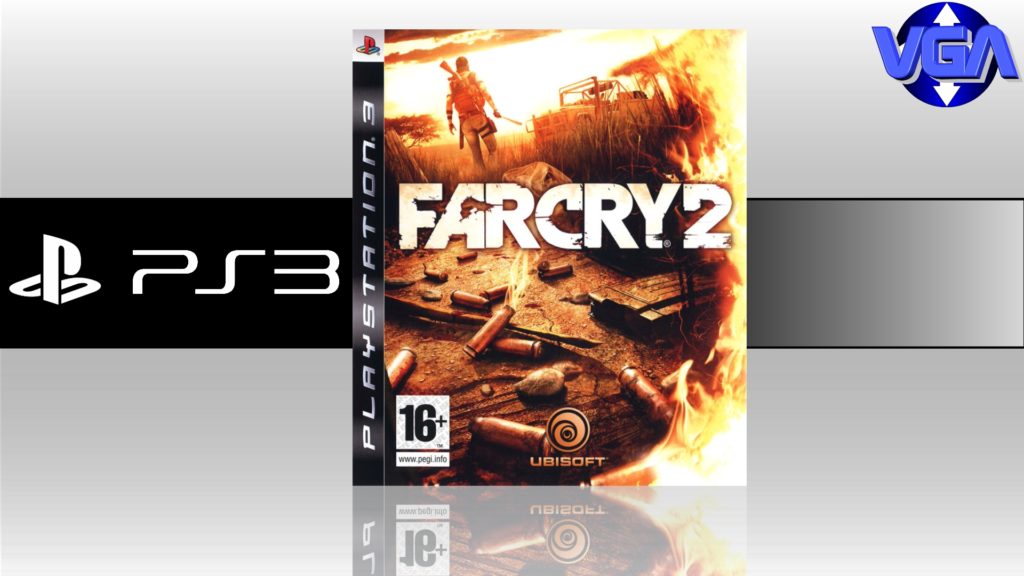Developer : Ubisoft
Release date : 2008
Synopsis :
Far Cry 2 is a 2008 first-person shooter developed by Ubisoft Montreal and published by Ubisoft for Microsoft Windows, PlayStation 3 and Xbox 360. A top-down shooter version for mobile phones was developed and published by Gameloft. It is the second mainline entry in the Far Cry series. Set in a fictional East African country engulfed in civil war, the storyline follows a mercenary who is assigned to kill the Jackal, a weapons dealer inflaming the conflict. The player navigates the open world, completing missions for factions and allies called Buddies while managing their health and equipment. A competitive multiplayer mode allows players to fight in teams or as individuals.
Production took three and a half years, with concept work beginning during the production of Far Cry Instincts (2005). Director Clint Hocking conceived the setting and design, which he wanted to be more realistic than the original Far Cry (2004). The narrative and tone, inspired by Joseph Conrad’s novella Heart of Darkness and Dashiell Hammett’s novel Red Harvest, focused on the lengths to which people would go to survive through terrible circumstances. The game was built using Dunia, a game engine created by Ubisoft based on the original game’s CryEngine. In pursuit of realism, the developers added real-time and reactive elements for enemies and the environment. The music, composed by Marc Canham, includes vocals by Senegalese singer Baaba Maal.
Far Cry 2 received positive reviews from critics, with praise for its setting, open-ended gameplay, Buddies, world design and visuals; however its writing, artificial intelligence and technical issues received negative attention. It received multiple game award nominations. By January 2009, the game had sold nearly three million copies worldwide. Far Cry 2 has continued to receive attention for its ambition and survival mechanics. The team used feedback from the game to develop Far Cry 3 (2012).
In the wake of a rebellion against the old government of an unnamed East African nation, civil war rages between the rebel forces’ two political factions, the United Front for Liberation and Labour (UFLL) and the Alliance for Popular Resistance (APR). While each claims to represent the people, they are equally brutal and exploitative with the civilian population. The situation is being worsened by the Jackal, an arms dealer distributing efficient low-price weapons to both sides in violation of a Joint Signatory Framework designed to stop the conflict escalating. The protagonist is one of a mercenary team sent into the country to kill the Jackal.
The mercenary arrives at a local town, only to succumb to malarial fever. The Jackal confronts him with his assumed failure, but does not kill him, leaving the mercenary to be incapacitated during an ambush on the town. The mercenary is rescued by members of the one of the factions, and ends up going on missions for both sides in the hope of catching up with the Jackal. He also meets Reuben Oluwagembi, a journalist covering the conflict, and after aiding him gains access to malarial medicine through the Underground network, which works to save the civilian population from the activities of the UFLL and APR. During one mission to assassinate the leader of one side, the mercenary’s employer betrays and nearly kills him, only for the Jackal to help him escape. Interactions with the Jackal, together with interview tapes that can be found in-game, reveal his disillusionment with the conflict.
The Jackal eventually confronts the mercenary, proposing they work together to save the civilians, and the mercenary is tasked with killing the UFLL and APR leaders. After killing the leaders, the mercenary meets with the Jackal, who reveals the factions are still hunting the civilians to either kill them or trap them in the country. He intends to bribe the border guards to let the civilians through while using explosives to prevent the soldiers’ pursuit. The mercenary is given the choice of detonating the explosives at the cost of his life, or bribing the guards and then committing suicide, with the Jackal taking the other job. Post-credit dialogue reveals the country descends into anarchy despite attempted peace talks, Reuben’s story is ignored by the press and he begins publishing it on his blog, the Underground is praised for its action saving civilians, and the Jackal’s body is never found.
Source : Wikipedia

